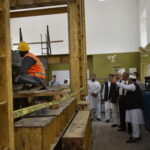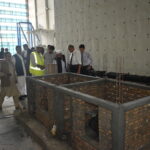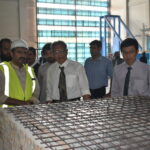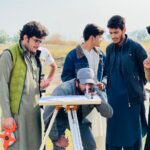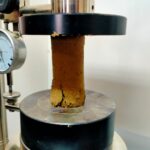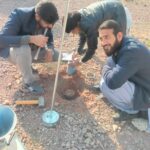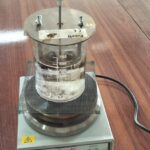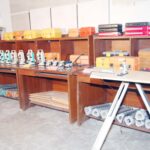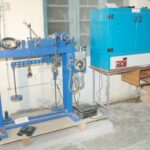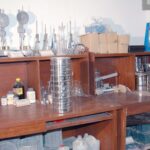Faculty Of Civil, Agricultural & Mining Engineering
Browse Links
NEED ASSISTANCE?
(+92-91) 9216796-8
Message From DEAN
It is a matter of great pride to welcome the brightest of our youth to the Faculty of Civil, Agricultural and Mining Engineering of UET Peshawar. In today’s competitive and globalized world, a professional and specialized education has become essential for future success. We are committed to providing practical and knowledge based academic excellence in the fields of Civil, Agricultural and Mining Engineering. Contributions of our graduates in terms of development and management to various economic and social sectors are countless and they have been at the forefront in the service of the society. This also reflects on the quality of teaching by our highly qualified and experienced faculty members.
Prof. Dr. Bashir Alam
Dean, Faculty Of Civil, Agricultural & Mining Engineering

Faculty Of Civil, Agricultural & Mining Engineering
Program Mission
“To produce civil engineers having the knowledge, skills, and professional attitude that will enable them to develop innovative, safe, economical, and sustainable solutions for society.”
About Department
The courses of study leading to the Degree of B.Sc. Civil Engineering have been planned to offer a broad spectrum of Civil Engineering subjects. The curriculum lays emphasis on subjects of structures, irrigation, geotechnical, transportation engineering, environmental engineering and hydraulics. These courses include laboratory and design work. The prescribed syllabi and examination standards compare favorably with the standard of under-graduate work developed in UK, USA and Canada. In addition to course work, the final year students are required to work on a project under the guidance of a senior faculty members. Study tours and extension lectures are also arranged during the session for the benefit of the students. Second or third year students during their summer break and final year students after passing the final examination in Civil Engineering may work with some recognized organizations, registered with PEC or government department or semi-government department to acquire practical training of 800 hours for award of degree. The Department of Civil Engineering offers a post-graduate programme with specialization in structural engineering, water resources engineering, environmental engineering, geotechnical engineering, transportation engineering and earthquake engineering.
Program Educational Objectives of Civil Engineering Department
Academic Programs
- B.Sc. Civil Engineering
- M.Sc. Civil Engineering
- Ph.D. Civil Engineering
Scheme of Studies
Laboratories
- The Department of Civil Engineering is supported by well-equipped laboratories having state-of-the-art machinery and equipment. It has the following laboratories:
- Concrete Laboratory
- Hydraulics Laboratory
- Soil Mechanics Laboratory
- Highway engineering Laboratory
- Material Testing Laboratory
- Surveying Laboratory
- Public Health Engineering Laboratory
- Postgraduate Computer Laboratory
- Undergraduate Computer Laboratory
- Structural Engineering Laboratory
- Earthquake Engineering Centre
Field Visits
Field visits to Civil Engineering projects of national importance are arranged for students. Each year students and concerned faculty members visit facilities/projects having high technical stature.
Each year field course in surveying and leveling is arranged, for students of third year Civil Engineering for a period of three weeks for site experience. The course includes hands-on work in contouring, triangulation, fly leveling and road surveying. The survey is done with theodolites, levels and total stations. Survey plots are prepared with both manual and computer-aided drawings.
Faculty
Program Mission
“To produce highly qualified, well rounded mining professionals leading the mining industry for development of society through knowledge based economy and extending innovation and research competitiveness at national and international level.”
About Department
Mining is one of the most progressive industries today based on its reliance on the state-of-the-art technology for the provision of basic raw materials to other industries. Mineral sector is playing a crucial role in the economic uplift of the Province. It provides raw materials for a number of mineral based industries including construction, power, mechanical, electrical, ceramics, paints, etc.
The graduates of this department are employed in the public sector including Mines and Minerals Development Department, Pakistan Mineral Development Corporation (PMDC), Oil and Gas Development Corporation Ltd (OGDCL), Pakistan Stone Development Company (PASDEC), Pakistan Atomic Energy Commission (PAEC) and various other private organizations like cement manufacturing operations and other mining related project.Program Educational Objectives of Mining Engineering Department
Academic Programs
- B.Sc. Mining Engineering
- M.Sc. Mining Engineering
- Ph.D. Mining Engineering
Scheme of Studies
Laboratories
- The Department is equipped with following laboratories:
- Mineral Processing Laboratory
- Surveying Laboratory
- Rock Mechanics Laboratory
- Geology Laboratory
- Ventilation, and Safety Laboratory
- Computer Laboratory
Field Visits
Field visits to Mining Engineering projects of national importance are arranged for students. Each year students and concerned faculty members visit different mining industries with a high technical merit.
Survey Camp for the students of Mining Engineering Department is arranged each year for a period of three weeks after 7th semester. The course includes hands-on work in contouring, triangulation, fly leveling and plane tabling.
Faculty
Program Mission
“To produce Agricultural Engineers equipped with professional knowledge, skills, and ethical values for effective socio-economical solutions to complex engineering problems”
About Department
The Department of Agricultural Engineering was established in 1961 in the then College of Engineering, University of Peshawar. This Department is the pioneer in initiating Agricultural Engineering education in the country and thus has the pride of producing the first batch of Agricultural Engineers in 1965 in Pakistan. Since then, hundreds of graduates of this department are rendering their valuable services in government departments, national and international organizations throughout the world. Our graduates have been instrumental in the development of Pakistan’s economy. Agricultural Engineering is the branch of Engineering that utilizes the engineering principles, materials and forces of nature for the benefit of agriculture and resultantly in the best interest of humanity. Agricultural Engineers are trained to creatively apply engineering and scientific principles in the design and development of new products, systems and processes for the conversion of raw materials and power sources into food, feed, and fiber while protecting the environment and workers health and safety. Agricultural Engineers offer their valuable services to design irrigation systems such as surface and high efficiency irrigation systems to utilize the precious waters to enhance agricultural productivity; design drainage systems to control the menaces of water-logging and salinity; design and develop strategies for flood management; develop soil and water conservation techniques for irrigated and rainfed areas; apply hydrology principles to predict and mitigate floods, landslides and drought risks; design farm structures for poultry, dairy, and storages for agricultural products; design dams and ponds for irrigation water supply; modify agricultural features by landscaping techniques; perform agricultural product processing, and environmental impact assessment; design new and improved farm machinery for agricultural mechanization; utilize different techniques of renewable energies to generate power for agricultural needs; apply geographic information system and remote sensing techniques to agricultural research; interpret research output, and implement relevant schemes. In general, they combine physical sciences with biological sciences and solve engineering problems related to agriculture.
Program Educational Objectives of Agricultural Engineering Department
Academic Programs
- B.Sc. Agricultural Engineering
- M.Sc. Agricultural Engineering
- Ph.D. Agricultural Engineering
Scheme of Studies
Laboratories
- The Department has the following well-equipped laboratories for practical work of students and research by the faculty members.
- Soil and Water Engineering Laboratory
- Irrigation Engineering Laboratory
- Farm Machinery Workshop
- Drainage Engineering Laboratory
- Postgraduate Computer Laboratory
- Undergraduate Computer Laboratory
- GIS and RS Laboratory
- I.C. Engine Demonstration Center
Field Visits
The Department maintains close liaison with Govt. Departments and private industries related to Agricultural Engineering. Field visits are arranged as per requirement of a particular course. Industrial tours are also arranged in each semester to enable the students to acquire practical knowledge and skills.
Each year practical training in the field of surveying and leveling is arranged for the students of 7th Semester for a period of three weeks which is mandatory for the award of degree. The students are trained in techniques like leveling, plane tabling, triangulation, contouring, road and irrigation channel surveys.
Faculty
Program Mission
“To educate current and future generations by providing quality Professionals Architectural Education, polish their creative capabilities and to impart skill based knowledge to prepare them for leadership role in their professions.”
About Department
The National Institute of Urban Infrastructure Planning (NIUIP) was established in 2010 with generous support from the Higher Education Commission (HEC) of Pakistan. The institute is committed to promote sustainable urban development in Pakistan, and to apply research in addressing challenges faced by rapidly growing urban centers in the country.
Academic Programs
- M.Sc.
- Urban Infrastructure Engineering
- Urban Infrastructure Planning & Management
- Ph.D.
- Urban Infrastructure Engineering
- Urban Infrastructure Planning & Management
Scheme of Studies
Faculty
Program Mission
“To produce civil engineers having the knowledge, skills, and professional attitude that will enable them to develop innovative, safe, economical and sustainable solutions for society.”
About Department
The courses of study leading to the Degree of B.Sc. civil engineering have been planned to offer a broad spectrum of civil engineering subjects. The curriculum lays emphasis on subjects of structures, irrigation, geotechnical, transportation engineering, environmental engineering and hydraulics. These courses include laboratory and design work.
The prescribed syllabi and examination standards compare favorably with the standard of under-graduate work developed in UK, USA and Canada. In addition to course work, the final year students are required to work on a project under the guidance of senior faculty members. Study tours and extension lectures are also arranged during the session for the benefit of the students. Second year or third year students during their summer break and final year students after passing the final examination in civil engineering may work with some recognized organizations, registered with PEC or government department or semi-government department to acquire practical training of 800 hours for award of degree.
Program Educational Objectives of Civil Engineering Department
Academic Programs
- B.Sc. Civil Engineering
Scheme of Studies
Laboratories
- The Department is supported by well-equipped laboratories having state-of-the-art machinery and equipment. It has the following laboratories:
- Environmental Laboratory
- Hydraulics Laboratory
- Concrete Laboratory
- Soil Mechanics Laboratory
- Applied Mechanics Laboratory
- Material Testing Laboratory
- Surveying Laboratory
- Transportation Laboratory
- Drawing Hall
Field Visits
Field visits to Civil Engineering projects of national importance are arranged for students. Each year students and concerned faculty members visit facilities and projects with a high technical merit.
Each year field course in surveying and leveling is arranged for students of third year Civil Engineering for a period of three weeks for experience. The course includes hands-on work in contouring, triangulation, fly leveling and plane tabling.
Faculty
Program Mission
“To produce civil engineers having the knowledge, skills and professional attitude that will enable them to develop innovative, safe, economical and sustainable solutions for the society.”
About Department
The courses of study leading to the Degree of B.Sc. civil engineering have been planned to offer a broad spectrum of civil engineering subjects. The curriculum lays emphasis on subjects of structures, irrigation, geotechnical, transportation engineering, environmental engineering and hydraulics. These courses include laboratory and design work.
The prescribed syllabi and examination standards compare favorably with the standard of under-graduate work developed in UK, USA and Canada. In addition to course work, the final year students are required to work on a project under the guidance of senior faculty members. Study tours and extension lectures are also arranged during the session for the benefit of the students. Second year or third year students during their summer break and final year students after passing the final examination in civil engineering may work with some recognized organizations, registered with PEC or government department or semi-government department to acquire practical training of 800 hours for award of degree.
Program Educational Objectives of Civil Engineering Department
Academic Programs
- B.Sc. Civil Engineering
Scheme of Studies
Laboratories
- The Department is supported by well-equipped laboratories having state-of-the-art machinery and equipment. It has the following laboratories:
- Environmental Engineering Laboratory
- Hydraulics Laboratory
- Concrete Laboratory
- Material Testing Laboratory
- Applied Mechanics Laboratory
- Soil Mechanics Laboratory
- Transportation Engineering Laboratory
- Surveying Laboratory
- Drawing Hall
- Computer Lab
Field Visits
Field visits to Civil Engineering projects of national importance are arranged for students. Each year students and concerned faculty members visit facilities and projects with a high technical merit.
Each year field course in surveying and leveling is arranged for students of third year Civil Engineering for a period of three weeks for experience. The course includes hands-on work in contouring, triangulation, fly leveling and plane tabling.
Faculty
FCAME consists of four departments
- Department of Civil Engineering (Peshawar)
- Department of Civil Engineering (Jalozai)
- Department of Civil Engineering (Bannu)
- Department of Minning Engineering (Peshawar)
- Department of Agricultural Engineering (Peshawar)
Key Message
“Dedicated to developing the students into leaders who will lead the world in innovation and technology sectors”.
Academic Programs
- BSc.
- M.Sc.
- PhD
Mission Statement
To support teachers in providing dynamic leadership for excellent teaching, research, innovation and support to industry thereby, contributing to sustainable socio-economic growth of Pakistan; and to produce well-rounded, enterprising engineering graduates possessed with strong ethical values, professionalism, willingness to work hard and dedicatedly towards improving the world a better place to live for all.

